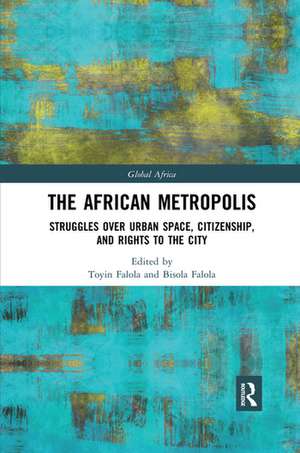The African Metropolis: Struggles over Urban Space, Citizenship, and Rights to the City: Global Africa
Editat de Toyin Falola, Bisola Falolaen Limba Engleză Paperback – sep 2020
The African Metropolis integrates geographical and historical perspectives to examine how processes of segregation, marginalization, resilience, and resistance are shaping cities across Africa, spanning from Nigeria and Ghana to Kenya, Ethiopia, and South Africa. The chapters pay particular attention to the voices and daily realities of those most vulnerable to urban transformations, and to questions such as: Who governs? Who should the city serve? Who has a right to the city? And how can the built spaces and contentious legacies of colonialism and prior development regimes be inclusively reconstructed?
In addition to highlighting critical contemporary debates, the book furthers our ability to examine the transformations taking place in cities of the global South, providing detailed accounts of local complexities while also generating insights that can scale up and across to similar cities around the world.
This book will be of interest to students and scholars of African Studies, urban development and human geography.
| Toate formatele și edițiile | Preț | Express |
|---|---|---|
| Paperback (1) | 389.38 lei 6-8 săpt. | |
| Taylor & Francis – sep 2020 | 389.38 lei 6-8 săpt. | |
| Hardback (1) | 766.24 lei 6-8 săpt. | |
| Taylor & Francis – 30 aug 2017 | 766.24 lei 6-8 săpt. |
Din seria Global Africa
- 8%
 Preț: 389.89 lei
Preț: 389.89 lei - 12%
 Preț: 301.33 lei
Preț: 301.33 lei - 13%
 Preț: 297.37 lei
Preț: 297.37 lei -
 Preț: 389.66 lei
Preț: 389.66 lei - 16%
 Preț: 275.07 lei
Preț: 275.07 lei - 17%
 Preț: 256.27 lei
Preț: 256.27 lei - 17%
 Preț: 259.98 lei
Preț: 259.98 lei -
 Preț: 356.87 lei
Preț: 356.87 lei -
 Preț: 389.66 lei
Preț: 389.66 lei -
 Preț: 389.66 lei
Preț: 389.66 lei -
 Preț: 389.66 lei
Preț: 389.66 lei -
 Preț: 187.68 lei
Preț: 187.68 lei -
 Preț: 389.88 lei
Preț: 389.88 lei -
 Preț: 389.66 lei
Preț: 389.66 lei -
 Preț: 389.66 lei
Preț: 389.66 lei -
 Preț: 390.80 lei
Preț: 390.80 lei - 18%
 Preț: 1000.27 lei
Preț: 1000.27 lei - 17%
 Preț: 244.27 lei
Preț: 244.27 lei - 16%
 Preț: 260.13 lei
Preț: 260.13 lei -
 Preț: 389.66 lei
Preț: 389.66 lei -
 Preț: 385.71 lei
Preț: 385.71 lei -
 Preț: 214.78 lei
Preț: 214.78 lei -
 Preț: 388.26 lei
Preț: 388.26 lei - 18%
 Preț: 1008.17 lei
Preț: 1008.17 lei
Preț: 389.38 lei
Nou
Puncte Express: 584
Preț estimativ în valută:
74.52€ • 76.31$ • 61.99£
74.52€ • 76.31$ • 61.99£
Carte tipărită la comandă
Livrare economică 18 martie-01 aprilie
Preluare comenzi: 021 569.72.76
Specificații
ISBN-13: 9780367341060
ISBN-10: 0367341069
Pagini: 306
Ilustrații: 74 Halftones, black and white; 13 Tables, black and white
Dimensiuni: 156 x 234 x 20 mm
Greutate: 0.45 kg
Ediția:1
Editura: Taylor & Francis
Colecția Routledge
Seria Global Africa
Locul publicării:Oxford, United Kingdom
ISBN-10: 0367341069
Pagini: 306
Ilustrații: 74 Halftones, black and white; 13 Tables, black and white
Dimensiuni: 156 x 234 x 20 mm
Greutate: 0.45 kg
Ediția:1
Editura: Taylor & Francis
Colecția Routledge
Seria Global Africa
Locul publicării:Oxford, United Kingdom
Cuprins
Introduction
Part I: The Politics of Space and Patterns of Segregation and Marginalization
1. Understanding the Zongo: Processes of Scoio-Spatial Marginalization in Ghana
2. Analytical Views on Past and Present Official and Cultural Narratives of Asmara
3. ‘Urban Man in Jos’: Growth, Transiting Power and Authority in a Conflict Prone City
4. The Rise, Fall, and Reemergence of Ponte City
5. Urban Renewal Schemes and the Plight of Internally Displaced Persons in Nigeria: A Study of Oke Ilu-Eri
6. Issues and Challenges in the Urban Renewal Programme of Lagos StatePart II: Everyday Claims to Space and Rights
7. Informal Citizens? Residents’ Perceptions of Space and Place in a South African Informal Settlement
8. Human Spaces and Urban Livelihoods: Language use in Makoko Slum Settlement 9. The Unheralded Politics of Urban Spaces in Nigeria: Case of City Prostitution and Precarious Livelihood
10. Conflicts and Urban Dwellers in Jos: Issues in Rights to City 11. Modernizing Makadara Gardens: Development and the Struggle for Urban Space in Kenya
Part I: The Politics of Space and Patterns of Segregation and Marginalization
1. Understanding the Zongo: Processes of Scoio-Spatial Marginalization in Ghana
2. Analytical Views on Past and Present Official and Cultural Narratives of Asmara
3. ‘Urban Man in Jos’: Growth, Transiting Power and Authority in a Conflict Prone City
4. The Rise, Fall, and Reemergence of Ponte City
5. Urban Renewal Schemes and the Plight of Internally Displaced Persons in Nigeria: A Study of Oke Ilu-Eri
6. Issues and Challenges in the Urban Renewal Programme of Lagos StatePart II: Everyday Claims to Space and Rights
7. Informal Citizens? Residents’ Perceptions of Space and Place in a South African Informal Settlement
8. Human Spaces and Urban Livelihoods: Language use in Makoko Slum Settlement 9. The Unheralded Politics of Urban Spaces in Nigeria: Case of City Prostitution and Precarious Livelihood
10. Conflicts and Urban Dwellers in Jos: Issues in Rights to City 11. Modernizing Makadara Gardens: Development and the Struggle for Urban Space in Kenya
Notă biografică
Toyin Falola is the Jacob and Frances Sanger Mossiker Chair in the Humanities, and a Distinguished Teaching Professor at the University of Texas at Austin, USA.
Bisola Falola studies spatial and social inequality as a researcher in the Department of Geography and the Environment at the University of Texas, Austin, USA.
Bisola Falola studies spatial and social inequality as a researcher in the Department of Geography and the Environment at the University of Texas, Austin, USA.
Descriere
This volume integrates geographical and historical perspectives to examine how processes of segregation, marginalization, resilience, and resistance shape cities across Africa. Who governs? Who should the city serve? And how can the built spaces and legacies of colonialism and prior development regimes be inclusively reconstructed?
